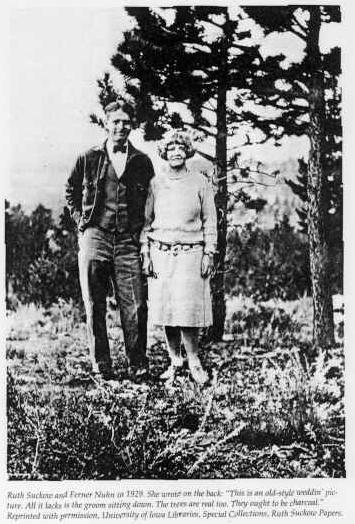Ruth Suckow (1892-1960)
Ruth Suckow was an American writer who wrote about ordinary farmers, small-town Iowans, and independent women. She was born in Hawarden, Iowa, and lived most of her life in that State, finally making Cedar Falls her home. In March 1929 she married Ferner Nuhn (1908-1989), a young literary critic, also from Cedar Falls. They moved to California in 1952 because of failing health.
The 1920s were the most successful years of Ruth Suckow's career, but she wrote all her life. It was not her only activity. She was a Quaker, like her husband, and devoted much of her time and energy to the conscientious objectors during World War II. She was the author of works which centre on family and church affairs: Country People (1924), Iowa Interiors (1926), The Kramer Girls (1930), The Folks (1934), Some Others and Myself (1952).
Ruth was much admired by the Norvegian writer Sigrid Undset, who wished to have her works translated into Norvegian, and by Robert Frost, with whom Ruth and Ferner had a friendly relationship. They were also both great friends of Phyllis Playter and John Cowper.
The irritation died away into calm, and she lay holding in the solitude of her own mind deeply felt, wordless things . . . as she had done in countless other nights; holding quiet both the beauty and the bitterness, encompassing them in the tranquillity of her comprehension. (Ruth Suckow, in "Golden Wedding", Iowa Interiors)
 |
|
Photo courtesy the Ruth Suckow Papers, Special Collections, The University of Iowa Libraries, Iowa City, Iowa |
Took Bonnie to the Labor Temple lecture where I met {Miss} Ruth Suckow, and I did like her so. I at once asked P.'s leave to ask her to tea. (John Cowper Powys' s Diary for 1929, December 20, 1929)
Miss Ruth Suckow & her young husband came to tea. We liked Ruth Suckow. She is a race-conscious or rather nation-conscious Middle Westerner. . silent. . formidable and wise. She and her young man are devotees of Dorothy Richardson.(John Cowper Powys' s Diary for 1929, December 26, 1929)
When John Cowper left the States for good in 1934, this is what Ferner Nuhn wrote:
During that quarter century I suppose there have been few individuals, either foreign or native, who have left over the length and breadth of the land so vivid an impression of a personality. From San Diego to Boston and from Charleston to Seattle there is hardly a sizeable community which does not graphically recall the dramatic figure, often in a scholar's black robe, with the electric eyes, the shock of wiry hair, and the face like a highly civilised savage, which once or oftener stood on some local platform. And in an era when teh lecturer, particularly the English visitor, has often been guilty of patronage, it is to be recorded with pleasure that John Cowper Powys never 'talked down' to an audience, whether in Lancaster Pa, Mount Vernon Iowa or New York city. Moreover, his listeners will testify to his particular capacity for electrifying even the most apparently familiar subjects. I have heard him speak memorably even upon Shakespeare.
For some years, doubtless happily as far as Mr. Powys is concerned, it has not been necessary for him to pursue the somewhat distressing paths of the lecturer. During this time his books have rightfully reached an enlarged audience and a change of residence is fortunately irrelevant in that department. But I have wanted here to speak for the countless individuals for whom Mr. Powys going up and down and to and fro in our land, his cultural good faith and generosity, in short, his presence here, has been cause for international gratitude.
(Ferner Nuhn, New York Herald Tribune Books, Sunday June 3, 1934)
|
|